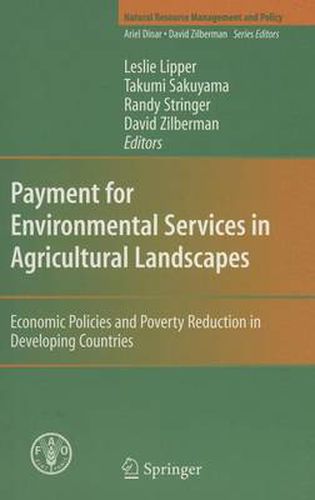Readings Newsletter
Become a Readings Member to make your shopping experience even easier.
Sign in or sign up for free!
You’re not far away from qualifying for FREE standard shipping within Australia
You’ve qualified for FREE standard shipping within Australia
The cart is loading…






This title is printed to order. This book may have been self-published. If so, we cannot guarantee the quality of the content. In the main most books will have gone through the editing process however some may not. We therefore suggest that you be aware of this before ordering this book. If in doubt check either the author or publisher’s details as we are unable to accept any returns unless they are faulty. Please contact us if you have any questions.
In recent years, development policy has responded to an increasing concern about natural resource degradation by setting up innovative payment for environmental services (PES) programs in developing countries. PES programs use market and institutional incentives in order to meet both environmental and poverty alleviation objectives. However, their optimal design, implications for the rural poor, and how these initiatives integrate into international treaties on global warming and biodiversity loss are still being discussed. This book addresses these issues by scrutinizing analytical tools, providing policy insights and stimulating debate on linkages between poverty alleviation and environmental protection. In particular, it turns attention towards the role of environmental services in agricultural landscapes as they provide a living for many poor in developing countries. It serves as a valuable reference for academics and students in various disciplines, as well as for policy makers and advisors.
This book is a co-publication between Springer and the Food and Agriculture Organization of the United Nations.
$9.00 standard shipping within Australia
FREE standard shipping within Australia for orders over $100.00
Express & International shipping calculated at checkout
This title is printed to order. This book may have been self-published. If so, we cannot guarantee the quality of the content. In the main most books will have gone through the editing process however some may not. We therefore suggest that you be aware of this before ordering this book. If in doubt check either the author or publisher’s details as we are unable to accept any returns unless they are faulty. Please contact us if you have any questions.
In recent years, development policy has responded to an increasing concern about natural resource degradation by setting up innovative payment for environmental services (PES) programs in developing countries. PES programs use market and institutional incentives in order to meet both environmental and poverty alleviation objectives. However, their optimal design, implications for the rural poor, and how these initiatives integrate into international treaties on global warming and biodiversity loss are still being discussed. This book addresses these issues by scrutinizing analytical tools, providing policy insights and stimulating debate on linkages between poverty alleviation and environmental protection. In particular, it turns attention towards the role of environmental services in agricultural landscapes as they provide a living for many poor in developing countries. It serves as a valuable reference for academics and students in various disciplines, as well as for policy makers and advisors.
This book is a co-publication between Springer and the Food and Agriculture Organization of the United Nations.